Ba Hons Game Art Design
Intro
The games market is a growing industry, with the UK gaming market hitting a record £7bn in 2020.
This degree is for ambitious students who want to design imagery and assets for innovative games on a variety of platforms. It covers character and environment design with a focus on visual narrative and play.
Our staff will inspire and guide you towards the originality and creativity essential for successful games design. You will be part our dynamic School of Art and Media, which places an emphasis on experimentation, joining a friendly community of creative students.
Diverse methods of learning keep the course stimulating – these include lectures, seminars, practical workshops and individual tutorials, as well as regular field trips.
When you graduate you will be able to research, develop and produce work to a professional standard in preparation for entering this fast-paced industry.
Key facts
Location Brighton: City campus
UCAS code W281
Full-time 3 years
Course content
Areas of study
- Experimental image making, visual effects , asset creation and concept art.
- Storytelling through a range of imaginative projects using linear and non-linear narratives.
- Games mechanics and architecture.
- Applied animation for immersive technology including AR and VR.
- Design for interactivity, tablets, apps, installations and expanded cinema.
- Collaboration with other disciplines including music, sound art and design.
Year 1
In year 1, you will explore the practical and analytical uses for games art and design, through a series of projects. Your work will be nurtured and developed through both group and personal tutorials, and inspired by a series of lectures from visiting industry professionals.
Under the guidance of expert teaching staff, you will immerse yourself in an exciting programme of lectures and workshops, shaping your projects and building your portfolio as you progress through the year.
In year 1 you will work alongside Design for Digital Media and Animation students, sharing modules and collaborating on projects.
Modules
- Games Art and Design Principles and Practice
This module introduces the basic concepts, components and practices of games art and design focusing on practice that is underpinned by research and imaginative experimentation. They will practically and analytically investigate the fundamental games design principles through a series of projects that will explore and begin to define working methods and studio practices.
- Sequence and Narrative
This module introduces the basic concepts and components of sequence and narrative within illustration, graphic design animation and games art. Project briefs enable you to explore story telling, form, pacing, play, presentation and audience interaction. You'll also be introduced to basic working methods and studio practices whilst exploring emerging digital delivery formats.
- Introduction to Games Design
This module provides an introduction to the foundations of games art and design. You'll gain the core planning skills needed to create a simple digital game, develop creative thinking skills, and explore creative approaches needed to create art work for digital games.
- Historical and Critical Studies
This module includes a broad history of visual communication. You'll focusing on new technologies and digital media, the impact the digital revolution has on the culture of graphic design, illustration, art, film, as well as the development of animation, games art, and social media.

Year 2
In year 2, you will focus on developing your creative potential, building on knowledge gained during your first year.
The projects you will be set have strong links with industry, so that the skills you learn and practise reflect those that employers are looking for.
You will be encouraged to work collaboratively with your fellow students to develop ambitious projects within the local and wider professional community. Your research and analytical skills will be developed through group discussion and documentation of project outcomes.
Modules
- Virtual Studio
- Visual Language and Personal Voice
- Advanced Games Design
- Historical and Critical Studies 2
- Option module programme
*Option modules are indicative and may change, depending on timetabling and staff availability.
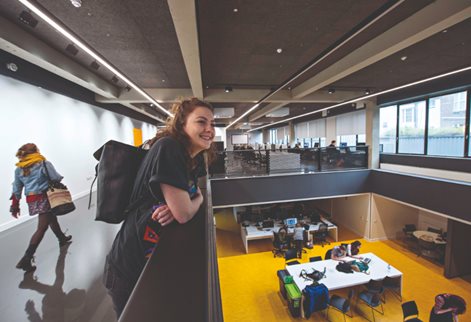
You'll be learning alongside other School of Art and Media students at our Edward Street building in the centre of Brighton.
Final year
In your final year, the knowledge and skills that you have developed so far come together as you work on a final personal project. You will also write a dissertation in conjunction with Historical and Critical Studies.
Final year lectures and tutorials are taught by teaching staff and by visiting industry professionals. They include practical information about professional development, preparing you for your professional or academic life after university, and one-to one personal tutorials offering in-depth, personalised support for your continued development.
Modules
- Context and Consolidation
- Virtual Studio – Games Art and Design
- Professional Practice
- Extended Research Project
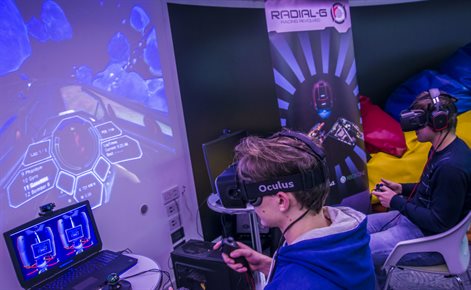
Meet the team
Professionals from the animation world support the course, keeping the curriculum at the forefront of modern practice and ensuring you develop relevant technological, artistic and communication skills.
Ewan Kirkland, course leader
Ewan is a specialist in animation history and a videogame scholar focussing on horror gaming. He is the author of Children's Media and Modernity exploring children's film, television and videogames. He is a frequent guest speaker at fan conventions and the lead academic on Historical and Critical Studies and Extended Research Project.
Since joining the University in 2010, Ewan has taught extensively in film, media and cultural studies, including popular television, screen histories, new media, merchandising and fantasy cinema. In addition. Read Ewan's full profile.
Vanessa Marr, senior lecturer
Vanessa is a graphic designer, illustrator writer/researcher and auto-ethnographer. She is also teaches on Animation BA(Hons) and Games Art and Design BA(Hons). She has taught for over 10 years and is passionate about supporting her students to become skilled and imaginative designers.
Her professional design experience includes working for a number of design agencies to produce print, web and motion design; as an Art Editor for Dorling Kindersley in London; and running her own design agency for over 10 years.
Her academic work takes a critical view of the hidden language of objects and fairy tales, which she explores primarily through embroidery and creative writing. Her work is underpinned by visual design theory and process, yet embraces an intuitive and physical approach that facilitates self-authorship and her continuing exploration of narrative and sequence. Read Vanessa Marr's full profile.
Kate Jessop, senior lecturer
Kate is a multi-award winning animation filmmaker who has had multiple exhibits and international distribution deals including with Shorts International and Amazon Prime.
She represented the UK in the Best of Women in Film and TV and was selected for the Berlinale Talent Lab both with her portfolio as a director and her with her comedy series chosen for development in the Project Lab. She had her first retrospective at the Gilbert Baker Film festival in USA 2019.
She has worked across narrative film, comedy, illustration, live visuals, music video and motion design and undertaken international artist residencies. Her areas of interest and expertise include satirical comedy, visual music/music video, kinetic typography and motion graphics, artists film, documentary, Dada, Bauhaus and feminist film. Favourite directors include Michel Gondry and Miranda July and favourite animated shows include Daria and Bojack Horseman. Read Kate's full profile.
Judith Ricketts, lecturer
Judith is an artist and creative coder specialising in mobile, screen based and immersive serious games. Her areas of expertise include photography, moving image, creative coding, augmented reality, virtual reality and data analysis with a focus on immersive interactive storytelling.
She has been a guest speaker at events such as FACT//University of Sussex, Heritage Network Brighton and Hove, Brighton Digital Festival and Digital Inequalities on subjects related to digital humanities and digital geographies.
She is also a visiting lecturer on the university's Photography BA(Hons) and is board member of the Centre of Digital Cultures and involved in outreach as a STEM Ambassador.
How this course is delivered
Our approach
We want you to spend as much time on campus as possible. From semester 1 of the academic year which starts in September, every student will have some face-to-face, on-campus learning in their timetable. Your timetable is being designed to make sure that you can make the most out of your time on campus, and all of the usual campus facilities – libraries, learning spaces, restaurants, gyms and more – will be open. Your timetable will be available in My Studies from late September.
Teaching on your course
Your practical learning will take place in studios, workshops and specialist teaching facilities on campus. The lectures and seminars covering theory-based topics will be taught online through MS Teams.
COVID-19
Like all universities we will be following government guidance and will be monitoring the pandemic very closely with our local Director of Public Health. Should a worsening of the pandemic occur and Public Health advice require us to make changes, we have robust plans in place for students to continue their studies remotely and for additional safety measures to be introduced on campus.
Our latest news
Careers
Prepare for your career
In your career you need a combination of knowledge, skills, personal qualities and relevant experiences – and you'll get all of this from your degree
- This degree teaches you the creative skills needed to enter this exciting industry – from how to work to client briefs to collaborating with other disciplines, to self-promotion and use of social media.
- We place an emphasis on your career development, so when you leave us you will have the skills, ambition and confidence to enter the games industry.
- We allow you to develop an individual, tailored approach to your studies, choosing your own creative path through the degree with support from our dedicated course team.
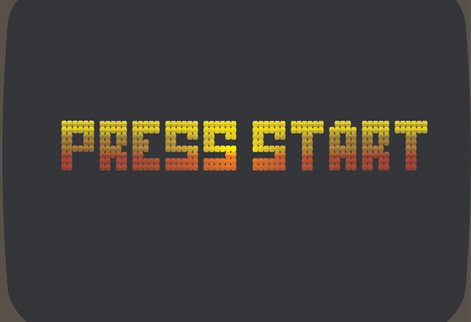
Showcasing your talent
There are opportunities to exhibit work publicly throughout the course.
At the end of the degree students exhibit their work in the university's graduate show, a large-scale exhibition that is the culmination of the final year and a major event attended by the public.
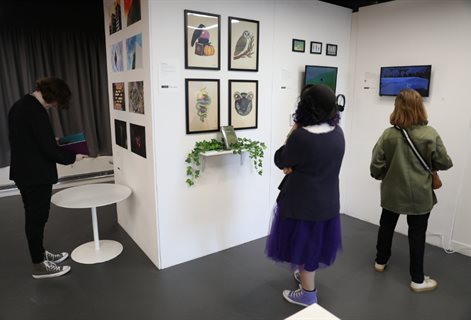
Graduate destinations
The computer games industry is growing at a rapid rate. This course will help you develop all the skills you need to enter this fast-paced and exciting industry.
When you graduate you will be in a position to find work for a games company or confidently create your own games. Potential roles for graduates of this course include:
- games designer
- games producer
- games animator
- games technical artist
- narrative designer
- concept artist
- project manager
- UX or UI (user experience or user interaction) designer
- app designer.
Brighton's digital economy
Home to over 1,000 companies in the digital sector, Brighton is well established as one of the UK's leading centres for creative media technology.
The university is the lead academic partner of the Digital Catapult Centre Brighton, which helps entrepreneurs and small businesses bring their digital services and products to market. Innovative projects developed by the centre include a national 5G testbed, backed by the University of Brighton, to help small businesses across the UK develop new products and services that can benefit from 5G technologies.
The testbed further enhances Brighton's growing international reputation for creativity and innovation, particularly in the digital sector which now contributes to over £1bn per year to its economy
As a student you can find internships and a doorway to job opportunities across the city through Wired Sussex, a local membership organisation for companies and individuals working in the digital sector.
Each year you'll also get to enjoy the Brighton Digital Festival which brings together the city's arts and digital cultures and communities. The festival welcomes around 47,000 visitors and features more than 150 events.
Supporting your employability
Outside of your course, our Careers Service is here to support you as you discover (and re-discover) your strengths and what matters to you. We are here for you throughout your university journey as you work towards a fulfilling and rewarding career.
Connect with our careers team
- Find part-time work that you can combine with your studies.
- Find, or be, a mentor or get involved with our peer-to-peer support scheme.
- Develop your business ideas through our entrepreneurial support network.
- Get professional advice and support with career planning, CV writing and interview top tips.
- Meet potential employers at our careers fairs.
- Find rewarding volunteering opportunities to help you discover more about what makes you tick, and build your CV.
Whatever your career needs, we are here to help. And that's not just while you are a student, our support carries on after you've graduated.
Find out more...
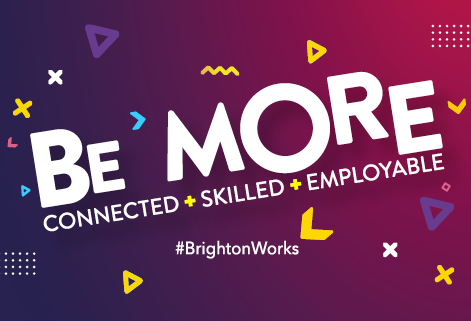
Employment demand for arts graduates
The British Academy has compiled a report (May 2020) quantifying the demand for arts, humanities and social science (AHSS) skills in the workplace. It helps to answer the legitimate question of what the economic return is on undertaking a degree, both in time and money.
According to the report:
- As arts, humanities and social science (AHSS) graduates progress through the first ten years of their career they are able make strong progress up the career ladder into roles attracting higher salaries
- Arts, humanities and social science (AHSS) graduates are employed in some of the fastest growing sectors including financial services, education, social work, the media and creative industries
- Of the ten fastest growing sectors, eight employ more graduates from AHSS than other disciplines
This makes AHSS graduates at the heart of some of the most exciting, productive, largest and fastest-growing sectors of the UK economy.
Future skills demand
According to the report:
- With the challenges the world is facing – climate change, global pandemics, the growth of populism – the UK needs the insights of the arts, humanities and social sciences (AHSS) as much as those from science, technology and engineering (STEM)
- Evidence within the report shows that Arts, humanities and social science (AHSS) graduates are central to these challenges and changes – they will be vital in giving us the tools to examine and explain human behaviour, understand how society functions, learn from the past and apply those lessons to the present, and analyse the drivers and implications of a changing world and how different countries, places and cultures interact.
Entry criteria
Entry requirements
A-levels or BTEC
Entry requirements are in the range of A-level BBB–BCC (120–104 UCAS Tariff points), or BTEC Extended Diploma DMM–MMM. Our conditional offers typically fall within this range.
International Baccalaureate
30 points, with three subjects at Higher level.
Access to HE diploma
Pass with 60 credits overall. Level 3 units in computing required. At least 45 credits at level 3, with 24 credits at merit or above.
Studied before or got relevant experience?
A qualification, HE credits or relevant experience may count towards your course at Brighton, and could mean that you do not have to take some elements of the course or can start in year 2 or 3.
English language requirements
IELTS 6.0 overall with a minimum of 5.5 in each element. Find out more about the other English qualifications that we accept.
We can help you meet our English language or academic entry requirements.
Visas and immigration advice
Portfolio advice
This course requires the submission of an online portfolio via Student View. In this, we would like to see:
- examples of work that demonstrates how you develop ideas. The work can be in any medium or combination of media, for example drawing, typography, collage, photography, animation or video.
- evidence of personal work including drawing, use of type, collage, photography, and other mediums. It would be great to see how this reflects your personal interests.
- your ability to develop an idea from concept through to a finished project
- at least one sketchbook showing how you experiment and explore different techniques and media
- any completed moving image, animation or interactive work (best shown on Vimeo)
- several examples of your finished outcomes in either 2D design, illustration, animation or moving image if you have them.
- your potential to experiment and explore ideas, using different techniques and media
- a passion for image-making and design.
Find out more about how to create and submit your portfolio.
We recommend using Flickr, Tumblr or making a pdf to create a simple portfolio and Vimeo or YouTube for embedding video. Please note that you do not need to show work that moves or interacts within a digital environment, as we will support you to develop that. At this stage we are looking for an exciting and creative portfolio and a genuine passion to learn.
Interview
Due to COVID-19, we expect interviews to be online and the processes may change slightly – check back here for updates. If you've already applied, we will tell you about any changes.
Fees
Course fees
UK (full-time) 9,250 GBP
International (full-time) 14,748 GBP
What's included
You may have to pay additional costs during your studies, although we have tried to keep this to a minimum. The cost of optional activities is not included in your tuition fee and you will need to meet this cost in addition to your fees. A summary of the costs that you may be expected to pay, and what is included in your fees, while studying a course in the School of Media are listed here.
- There will be opportunities to attend field trips and off-site visits. These are optional and are not required to pass your course but you can budget approximately £30–£700 for these. The nature of the costs vary from provisions for a packed-lunch to flight and accommodation costs for international field trips. The amount spent would be based on location and number of trips taken.
- Typically, practice-based courses incur more costs than text-based subjects. These costs are normally associated with specialist equipment and materials for making work and for the public presentation of work.
- Specialist equipment is provided to cover essential learning. Students may choose to buy their own specialist equipment, these may include cameras, or computers and software. Budgets can range from £50–£2,000. Buying specialist equipment is best undertaken in consultation with our academic and technical staff. This expenditure is not essential to pass any of our courses.
- For some courses you will need to budget up to £200 for printing and publishing. Photography courses may incur higher costs (£500–£2,000) when printing and framing images of professional standard for public presentation.
- Course books are available from the university but you may wish to budget up to £200 to buy your own copies.
- For some courses you will need to budget up to £150 for stationery.
- Final-year graduation shows are opportunities to present your final, independent project work to the public. Practice-based courses will typically incur higher costs. Depending on the specific nature of your final project you will need to budget between £20–£2,500.
You can chat with our enquiries team through the Stay in touch panel at the end of this page if you require further information. Or check our finance pages for advice about funding and scholarships, as well as more information about fees and advice on international and island fee-paying status.
Info
The fees listed here are for full-time courses beginning in the academic year 2021–22.
Further tuition fees are payable for each subsequent year of study and are subject to an annual increase of no more than 5% or RPI (whichever is the greater). The annual increase for UK students, who are subject to regulated fees, will increase no more than the statutory maximum fee.
You can find out more about our fees in the university's student contract and tuition fee policy (pdf).
The tuition fee you have to pay depends on a number of factors including the kind of course you take, and whether you study full-time or part-time. If you are studying part-time you will normally be charged on a pro rata basis depending on the number of modules you take.
Location
Campus where this course is taught
City campus
City campus is located at the heart of central Brighton.
The facilities for making and designing, the theatre, galleries, workshops, studios, archives and the independent arts organisations based on site provide a unique and inspiring environment where creativity thrives.
St Peter's House library and Phoenix halls of residence are close to the exhibition and learning facilities in the Grand Parade main building where you will also find the student centre with careers, counselling, student advice service and disability and dyslexia support. Edward Street provides extensive teaching and gallery space for media, photography and film.
Also on site are Photoworks, Screen Archive South East and University of Brighton Design Archives. Leading visual arts agency Photoworks runs the Brighton Photo Biennial and a national programme which frequently features the work of our graduates, staff and students.
Brighton Pavilion, Brighton Museum and Art Gallery, the iconic pier and beach are a very short walk away. The independent shops and businesses of the North Laine and Kemptown, and Brighton main line station, with frequent express services to London, are 10 minutes walk.
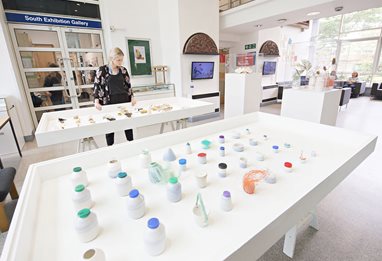
Accommodation
Brighton: City campus
We guarantee an offer of a place in halls of residence to all eligible students who apply by 30 June.
Halls of residence
We have halls of residence across Brighton in the city centre, Moulsecoomb, Varley Park and Falmer. All rooms are self-catered.
- You'll be prioritised for accommodation in the halls that are linked to your teaching base, subject to availability.
- City campus is linked to Phoenix halls, Mithras halls and Moulsecoomb Place.
- Phoenix halls are a short walk from City campus in the centre of Brighton.
- Mithras hall and Moulsecoomb Place are located on the Moulsecoomb campus, around two miles from City campus. Public transport in the city is excellent.
Want to live independently? We can help – find out more about private renting.
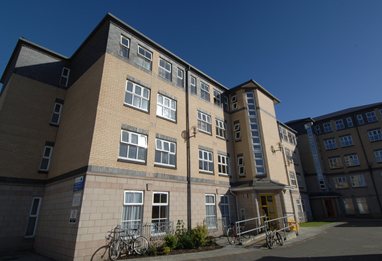
Accommodation for City campus is in the nearby Phoenix Halls

Student kitchen in Phoenix Halls
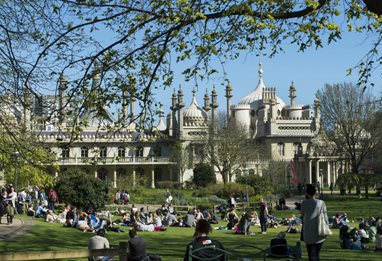
Relaxing in nearby Pavilion Gardens
Local area
About Brighton
The University of Brighton is at the heart of our city's reputation as a welcoming, forward-thinking place which leads the way when it comes to the arts, music, sustainability and creative technology. Brighton is home to a thriving creative community and a digital sector worth £1bn a year. Many of the work-based learning opportunities offered on our courses such as placements, live briefs and guest lectures are provided by businesses and organisations based in the city.
We provide support and venues for key events in the city's arts calendar including the Brighton Festival, the Festival Fringe, the Great Escape, the Brighton Digital Festival, Brighton Photo Biennial and the CineCity Brighton Film Festival. Other annual highlights include Pride, the Brighton Marathon, and Burning the Clocks which marks the winter solstice. Our own Brighton Graduate Show transforms our campus into the largest exhibition space in the South East as we celebrate the outstanding talent and creativity of our students.
As a student you'll get lots of opportunities to experience these events at first hand and to develop your skills through the volunteering and other opportunities they offer.
You'll find living in Brighton enriches your learning experience and by the end of your course you will still be finding new things to explore and inspire you.
It's only 50 minutes by train from Brighton to central London and less than 40 minutes to Eastbourne. There are also daily direct trains to Bristol, Bedford, Cambridge, Gatwick Airport, Portsmouth and Southampton.
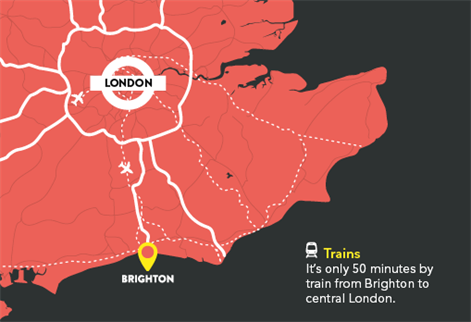

Stay in touch
If you have a question about this course, our enquiries team will be happy to help.
01273 644644
Statistics
Find out more about how the academic year and degree courses are organised, and about learning and assessment activities you might get to grips with at Brighton. More specific information about this course is detailed in the programme specification (linked below). You can find out also about the range of support we offer to help you adjust to university life.
Course and module descriptions on this page were accurate when first published and are the basis of the course. Since this information was published we have made some changes in response to government guidance and social distancing requirements. We are looking forward to being on campus in the autumn, however if government advice changes we may need to make some adjustments to our plans. Find out the latest news on our FAQ for students starting in 2021. Detailed information on any changes we make to modules and learning and assessment activities will be sent to all students by email before enrolment, so that you have all the information before you come to Brighton.
Discover Uni
Discover Uni enables you to compare information when choosing a UK university course. All UK universities publish Discover Uni data on their website.
Programme specification
The programme specification is the approved description of each course. They give a detailed breakdown of the content and structure of the course, and are updated following course changes.
Programme specification
Search again
Ba Hons Game Art Design
Source: https://www.brighton.ac.uk/courses/study/games-art-and-design-ba-hons.aspx
Posted by: brownworseente.blogspot.com

0 Response to "Ba Hons Game Art Design"
Post a Comment